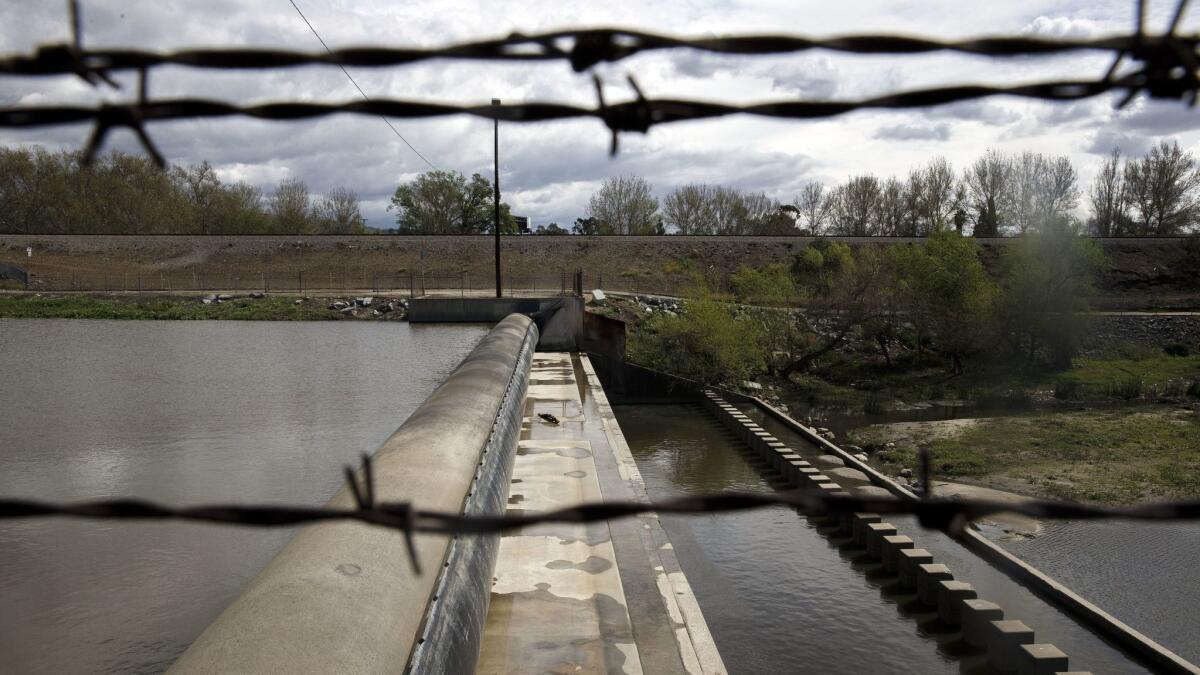Endorsement: Yes on Measure W for clean beaches and oceans — and, possibly, ‘new’ drinking water

- Share via
Los Angeles County Measure W is a parcel tax to pay for cleaning up stormwater — the dirty runoff created when rain hits the streets and other paved surfaces, picks up toxic urban gunk and carries it downstream to foul the beaches and pollute the ocean. Depending on how you look at it, the measure is either a hard but necessary pill to swallow or an exciting step into the future. In either case, it’s the right move, and The Times urges voters to say yes.
Cleaning stormwater is not merely a nice thing to do for the environment. L.A.’s 88 municipalities and its unincorporated county area routinely violate federal and state laws that govern toxic pollutants and protect drinking water supplies and the environment. Those cities and the county will soon be hit with fines that will mount into billions of dollars. These penalties would drain their budgets of funding for police and fire protection — and they would not stop until the violations ceased. The alternative is to invest in projects that will put them into compliance.
Measure W is that investment. It would build the infrastructure to capture both the daily dry-weather runoff (from lawn sprinklers, for example) and the winter rainwater that gushes down the pavement and into storm drains. Instead of flowing into the ocean, the captured water would be cleaned of its most noxious pollutants and then allowed to percolate into the ground, where it could later be tapped as a drinking water source to replace or augment the shrinking supplies of water that currently come to Southern California at great cost from the Colorado River, the Sacramento-San Joaquin River Delta and, in the case of the city of L.A., the Eastern Sierra via the Owens Valley.
Los Angeles County Measure W is a parcel tax to pay for cleaning up stormwater.
That imported water has become increasingly unreliable due to drought and rising temperatures in the mountains and points north. To keep quenching its thirst, L.A. will have to develop its local water supplies.
Let’s be clear: Measure W would not immediately turn all our runoff into sparkling clear drinking water. The primary purpose of the measure is to stop the flow of water-borne toxins and other pollutants into the ocean. But the funding would also help to develop alternative supplies.
If California were to start from scratch, it would probably develop its water, sewer and stormwater services differently so that they could work together seamlessly and share revenue for projects that produce multiple, complementary benefits. Your water bill would cover the water delivered to you and the sewage taken away, plus the water that otherwise would rush to the sea but is instead captured, cleaned and reused.
But that’s not how it works. Water and sanitation agencies can’t bill their customers for cleaning stormwater, even though state and federal agencies can penalize cities for not doing it. There are no stormwater ratepayers who deliver a steady stream of revenue. As a result, cities can’t sell bonds to build stormwater projects the way that water and sewer utilities can for their missions. Cities and regional agencies already have detailed plans for projects to clean up stormwater, but they can’t actually build anything because they have no funding source. Measure W would provide the source. At the same time, it would give water and sanitation agencies incentives to design projects in tandem, to get multiple benefits from the same tax dollars.
Enter the Fray: First takes on the news of the minute from L.A. Times Opinion »
The measure imposes a tax on property owners of 2½ cents per square foot of impermeable surface — meaning ground that is paved over or otherwise doesn’t let water pass through. That comes to about $83 a year for the average single-family homeowner. (Property owners can see estimated bills using an online tool developed by the county.)
Why not just a flat parcel tax that everyone pays equally? Because the point is to get water into the ground instead of rushing down the street and into the storm drains. There is no tax on non-paved surfaces — or even on technologically advanced pavements that allow water to pass through.
It would be nice if the county and water agencies were straightforward with residents and explained how much more they should expect to pay in the coming years just to cope with decreasing water supplies from traditional sources. Measure W won’t be the end of it. Still, it is a responsible measure that will go a long way toward keeping L.A. habitable.
Follow the Opinion section on Twitter @latimesopinion and Facebook
More to Read
A cure for the common opinion
Get thought-provoking perspectives with our weekly newsletter.
You may occasionally receive promotional content from the Los Angeles Times.









